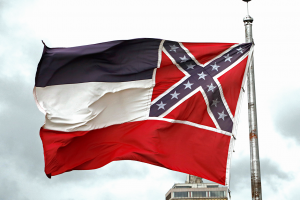AT THE END of August, activists in Detroit, like those in dozens of U.S. cities, sued their local government for its police department’s reaction to this year’s Black Lives Matter mobilization. Their complaint alleges that Detroit cops “repeatedly responded with violence” when they took to the streets and includes photos and descriptions of some of the gruesome resulting injuries: bruised and broken ribs, concussions, a collapsed lung, a fractured pelvis. In light of this brutality, the protesters asked a federal judge to bar the police from using “tools of excessive force,” like chemical weapons, sound cannons, and rubber bullets, against them.
Less than a month later, after the court issued temporary orders restricting the cops’ use of force, the city filed its official response. It includes a line-by-line denial of every brutality accusation — and a countersuit.
Detroit’s demonstrators are part of a “civil conspiracy,” the city’s countersuit alleges, “to disturb the peace, engage in disorderly conduct, incite riots, destroy public property,” and resist police orders, among other “illegal acts.” The countercomplaint asks the court to issue judgments declaring that the protesters engaged in this conspiracy and “defamed” the mayor and police, and to award the city damages.
The countersuit against Black Lives Matter protesters is a novel move in the post-George Floyd moment, and it has lit a fire under already boiling local tensions. The city has tried to portray it as a routine legal tactic, but many see the counterattack as an effort to suppress the right to protest and to shift the public narrative away from the police department’s violence. Rep. Rashida Tlaib, D-Mich., whose congressional district includes much of Detroit, has lambasted it as “an unthinkable assault on constitutional rights.”
The protesters are fighting back on two separate tracks: one in court, with the backing of national legal groups, and another in the city council, which has the power to cut off funding for the city’s litigation. One council member has already vocalized her opposition to the countersuit, and the activists are working to lobby others ahead of a vote early next year.
The situation highlights how officials across the country have weaponized the legal system to suppress the Black Lives Matter movement — like with the overuse of felony charges against protesters, something the Detroit activists have also experienced. When activists gathered in a suburb in October to march in defiance of racist policing, local cops in riot gear attacked them minutes after they took the street and eventually charged five with felonies. The prosecutor has not dropped the charges, despite pressure from community members, activists, and members of Congress.
“These attacks against us are a way of attempting to minimize our ability to go on the offensive and call for transparency and accountability,” said Tristan Taylor, a protest leader and plaintiff in the demonstrators’ original lawsuit. “This is just a way of saying to people, ‘This is not a place where you can raise your voice.’”
IN DETROIT, the reckoning over policing that swept the nation after the cop killing of George Floyd in May has been a struggle between two deeply entrenched sides. On one is the city’s protest movement and its umbrella collective, Detroit Will Breathe, the lead plaintiff in the original suit. On the other is the Detroit Police Department and its head, Chief James Craig.
Craig has been clear about his strategy in dealing with Detroit Will Breathe: “We don’t retreat,” he told host Tucker Carlson on Fox News, where he has appeared several times since this year’s movement began. While rarely offering specifics about the group’s wrongdoing, Craig has labeled Detroit Will Breathe a group of “criminals” and “misguided radicals” who “incite violence.” “I absolutely am not going to allow them to take over our city streets,” he told another Fox News host. He has also lobbed conspiratorial accusations at the Black Lives Matter movement at large, telling “Fox and Friends” that it is “coordinated,” “planned,” and “financed” by “a Marxist ideology” trying to “undermine our government as we know it.”
As Craig has bragged on Fox News, he has the support of Detroit’s Democratic mayor, Mike Duggan, who has called Craig’s protest policing “beautiful” and “outstanding.” According to protesters, the city’s countersuit is an extension of Craig’s pugnacious response to their activism.
“It’s just another blatant attempt to silence and intimidate us,” said Lauren Rosen, an organizer with Detroit Will Breathe and a plaintiff. “Except now … they want to do it through the courts instead of in the streets.”
The city’s countersuit claims that Detroit Will Breathe activists made false statements about cops — evidence, the city says, of a “civil conspiracy” and that protesters “defamed” Detroit police (though the city clarified in a recent filing that it isn’t suing outright for defamation). But many of the assertions to which the city points seem to be political statements rather than factual inaccuracies. In one instance, the city claims that Nakia Wallace, a Detroit Will Breathe leader, “falsely characterized [Detroit police] officers” by posting on Twitter about the “murderous and brutal nature of the Detroit Police Department.” In another, it claims that a Detroit Will Breathe member “falsely” described the “‘mentality’” of Detroit police as one of “‘the wild, wild West.’”
The countercomplaint also accuses Detroit Will Breathe of peddling a “false narrative to rile the public” about the fatal police shooting of 20-year-old Hakim Littleton in July, noting that body and dashcam footage released the day of the killing “shows the man fire a gun at an officer before police shot him.” Missing from the city’s account is the key reason people are still protesting the incident: Video suggests that police landed most of their shots on Littleton, including one apparently to the head, after tackling him to the ground and kicking his gun away.
The city’s lawsuit also nitpicks Detroit Will Breathe members’ characterization of the police violence they’ve endured. In particular, in the countercomplaint and an earlier filing, the city takes issue with Wallace’s accusation that a cop placed her in a “chokehold” during a protest on the day of Littleton’s killing. Despite a photo showing a helmeted officer with her flexed arm wrapped tightly around Wallace’s throat, the city claims that, while arresting Wallace, the officer “lost her hold, which caused her arms to momentarily touch Wallace’s neck.” The amount of time the officer’s arm was around Wallace’s neck “was far too brief” to fit the Oxford English Dictionary’s definition of a chokehold, the city asserts, and Detroit Will Breathe’s “improper use of this incendiary term demonstrates their desire to falsely alarm the public and the Court.”
“She took me down with very clear intentions — I couldn’t breathe,” Wallace told The Intercept. The chokehold denial is just one of many “ridiculous arguments you would not expect somebody who works for city government to make.”
An organization called the National Police Association has filed the only friend-of-the-court brief in support of the city’s arguments. Despite its official-sounding name, the National Police Association is a small “Blue Lives Matter” ideological group with no apparent law enforcement connections. (Association President Ed Hutchison told The Intercept he was unaware that “law enforcement backgrounds are required to operate” a nonprofit.) According to the association’s website, it aims to “fight back against cop-haters,” implement “‘Broken Windows’ policing policy for all state and local agencies,” and authorize “local law enforcement officers to perform federal immigration law enforcement functions.” The Bopp Law Firm, a Terre Haute, Indiana-based practice “dedicated to the advancement of conservative Republican principles,” assisted with the brief.
“I think [the countersuit] is much more political than legal,” said Julie Hurwitz, an attorney representing Detroit Will Breathe on behalf of the National Lawyers Guild. “The city is seeking to do whatever it can to discredit the extremely effective organizing that’s been going on in the city of Detroit.”
In response to a list of questions about the countersuit, the city of Detroit’s principal attorney, Corporation Counsel Lawrence Garcia, told The Intercept, “We prefer not to comment on active litigation.”
IN ASSERTING A “civil conspiracy,” the city’s countersuit also alleges that “the protests in Detroit have repeatedly turned violent, endangering the lives of police and the public” — and because of this, Detroit Will Breathe’s demonstrations shouldn’t be considered First Amendment-protected activities.
The city claims that, during four protests, activists injured Detroit police officers by throwing objects at them and resisting arrest; an earlier court filing claims that the injuries include “cracked vertebrae, lacerations, and concussions.” But the documents provide no details on how each injury occurred, and whom among the protesters caused the injuries. The filings also repeatedly claim that protesters were “destroying and defacing public property,” but give only two examples: a police car window shattered on an unspecified date and a statue of a slave owner spray-painted in September. The countersuit’s most detailed accusations of Detroit Will Breathe’s “unlawful” behavior center on activists repeatedly ignoring police orders to disperse.
Detroit Will Breathe’s complaint, by contrast, includes extensive details on the violent actions of Detroit police officers. One protester named in the suit claims that she was shot in the chest with a rubber bullet, which pierced her skin and tissue, after being tear-gassed and beaten with a riot shield without provocation; she experienced panic attacks for months after. Another protester claims that she suffered a head injury after being pushed to the pavement and trampled; she experienced migraines for weeks. Another had her pelvis fractured when a cop hit her with a baton; a doctor advised her not to walk for several months. Another suffered a broken rib and collapsed lung when an officer beat him over the back. Two got concussions when an officer hit them over the head with their baton. Others describe being tackled, beaten, pepper-sprayed, and tear-gassed on multiple occasions.
Rosen, the Detroit Will Breathe organizer, suffered ear damage after police blasted her with a Long Range Acoustic Device, or LRAD, also known as a sound cannon. “I experienced vertigo, dizziness, nausea, tinnitus,” she told The Intercept. For days she had difficulty sleeping and eating, “and because of not being able to really eat and the stress, I lost a significant amount of weight.”
Based on the disparity between the city’s open-ended allegations of unlawfulness and the protesters’ detailed complaints of police brutality, Detroit Will Breathe filed a motion to dismiss the city’s countersuit at the end of October. That motion is still being litigated.
“The law is very well settled that when you’re going to bring a claim, you need to be able to back it up, and you need to be able to back it up on its face,” said Amanda Ghannam, another lawyer representing Detroit Will Breathe on behalf of the National Lawyers Guild. “They’re just going with these really broad brush strokes trying to paint the entire movement as lawless and violent.”
A FIGHT OVER the countersuit is currently brewing in the Detroit City Council’s internal operations committee, which oversees and issues recommendations on city funding decisions.
In order to continue work on the Detroit Will Breathe lawsuit, Garcia, the city’s attorney, has asked the council and the committee to approve an extension and expansion of a contract with the private law firm, Clark Hill, assisting his office with the litigation. The proposal would add the Detroit Will Breathe case, an additional year, and an added $200,000 to a preexisting five-case, $150,000 contract, according to a memo from the city council’s legislative policy division obtained by The Intercept.
During a November 18 internal operations committee meeting, nearly 20 people, many organized by Detroit Will Breathe, called in to denounce the city’s countersuit and oppose the contract.
“This is an attack on racial justice movements, and it’s a really egregious thing to spend public money on,” said one of the callers. Garcia responded to the concerns by portraying the counterclaim as a routine move. “The city files these types of countersuits when it’s legally advisable to do so,” he said.
Council Member Raquel Castañeda-López then asked Garcia whether the city had ever countersued activists protesting against police brutality, prompting him to admit that he believed this was a first. But he maintained that the protest movement is also an unprecedented situation. “I’m not aware of another occasion where there’s been a concerted effort to block city streets and assault police officers,” he said. To this, Castañeda-López called his bluff, pointing out that Detroit is famously known for its history of insurrections, riots, and civil rights demonstrations.
“The claims in the countersuit are ludicrous,” Castañeda-López told The Intercept. “If we as a city begin countersuing residents for protesting, it’s setting the first stone on the path of making it even more legally permissible to violate people’s First Amendment rights.”
Several of the callers during the committee meeting brought up the civil rights movement and painted the countersuit as a “segregationist” tactic, echoing an argument made by Detroit Will Breathe leaders.
“That’s what King went to jail for, right?” said Taylor. “Because [Birmingham] wouldn’t give him permits for doing civil rights demonstrations.”
Legal advocates agree with the analysis. Detroit’s “counterclaim is dangerous and it is chilling,” the American Civil Liberties Union wrote in a brief. “The theory behind it could have been used to justify imposing ruinous liability on generations of civil rights protesters.”
The internal operations committee adjourned the November meeting, against Garcia’s objections, with a decision to revisit the contract proposal at a closed session in late January, an idea suggested by Council Member James Tate, before it’s reconsidered by the committee and sent to the full council. A spokesperson for Tate, a former second deputy chief at the Detroit Police Department, said that he will “reserve his opinion on the contract” until after the closed session and that he is “troubled by the allegations levied” by both sides of the lawsuit. The seven remaining members of the Detroit City Council did not respond to The Intercept’s inquiry about their position on the contract proposal and the city’s countersuit.
“They’re trying to send a message to the Black Lives Matter movement, to anybody standing up against state power and trying to hold them accountable,” said Wallace. But the movement has an “opportunity,” she said, “to bring forth meaningful change, and the responsibility to not allow ourselves to be co-opted or silenced or bullied off the streets.”




